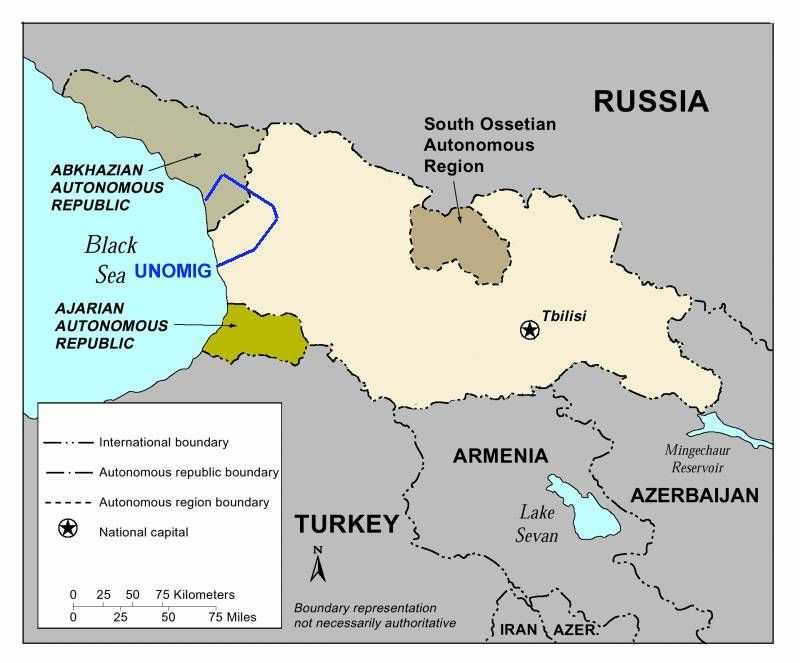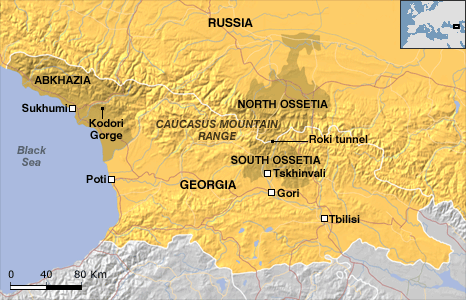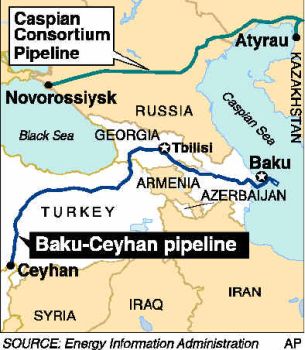War in the Caucasus: Towards a Broader Russia-US Military Confrontation?
Michel Chossudovsky | 12.08.2008 17:19 | Analysis | Anti-militarism | Terror War | London | World
conflict? Supported by media propaganda, the Western military alliance is
intent on using this incident to confront Russia, as evidenced by recent NATO
statements.



Beijing Olympics, Georgia's president Saakashvili ordered an all-out military
attack on Tskhinvali, the capital of South Ossetia.
The aerial bombardments and ground attacks were largely directed against
civilian targets including residential areas, hospitals and the university.
The provincial capital Tskhinvali was destroyed. The attacks resulted in some
1500 civilian deaths, according to both Russian and Western sources. "The air
and artillery bombardment left the provincial capital without water, food,
electricity and gas. Horrified civilians crawled out of the basements into the
streets as fighting eased, looking for supplies." (AP, August 9, 2008).
According to reports, some 34,000 people from South Ossetia have fled to
Russia. (Deseret Morning News, Salt Lake City, August 10, 2008)
The importance and timing of this military operation must be carefully
analyzed. It has far-reaching implications.
Georgia is an outpost of US and NATO forces, on the immediate border of the
Russian Federation and within proximity of the Middle East Central Asian war
theater. South Ossetia is also at the crossroads of strategic oil and gas
pipeline routes.
[Image1_georgiamap1.jpg]
[Image2_georgiamap2.gif]
Georgia does not act militarily without the assent of Washington. The Georgian
head of State is a US proxy and Georgia is a de facto US protectorate.
Who is behind this military agenda? What interests are being served? What is
the purpose of the military operation.
There is evidence that the attacks were carefully coordinated by the US
military and NATO.
Moscow has accused NATO of "encouraging Georgia". Russia's Foreign Minister
Sergey Lavrov underscored the destabilizing impacts of "foreign" military aid
to Georgia:
"It all confirms our numerous warnings addressed to the international
community that it is necessary to pay attention to massive arms purchasing
by Georgia during several years. Now we see how these arms and Georgian
special troops who had been trained by foreign specialists are used," he
said.(Moscow accuses NATO of having "encouraged Georgia" to attack South
Ossetia [1] , Russia Today, August 9, 2008)
Moscow's envoy to NATO, Dmitry Rogozin, sent an official note to the
representatives of all NATO member countries:
"Russia has already begun consultations with the ambassadors of the NATO
countries and consultations with NATO military representatives will be held
tomorrow," Rogozin said. "We will caution them against continuing to further
support of Saakashvili."
"It is an undisguised aggression accompanied by a mass propaganda war," he
said.
(See Moscow accuses NATO of having "encouraged Georgia" to attack South
Ossetia [1] , Russia Today, August 9, 2008)
According to Rogozin, Georgia had initially planned to:
"start military action against Abkhazia, however, "the Abkhaz fortified
region turned out to be unassailable for Georgian armed formations,
therefore a different tactic was chosen aimed against South Ossetia", which
is more accessible territorially. The envoy has no doubts that Mikheil
Saakashvili had agreed his actions with "sponsors", "those with whom he is
negotiating Georgia's accession to NATO ". (RIA Novosti, August 8, 2008)
Contrary to what was conveyed by Western media reports, the attacks were
anticipated by Moscow. The attacks were timed to coincide with the opening of
the Olympics, largely with a view to avoiding frontpage media coverage of the
Georgian military operation.
On August 7, Russian forces were in an advanced state readiness. The
counterattack was swiftly carried out.
Russian paratroopers were sent in from Russia's Ivanovo, Moscow and Pskov
airborne divisions. Tanks, armored vehicles and several thousand ground troops
have been deployed. Russian air strikes have largely targeted military
facilities inside Georgia including the Gori military base.
The Georgian military attack was repelled with a massive show of strength on
the part of the Russian military.
In this image made from television, Russian military vehicles are seen moving
towards the capital of South Ossetia, Tskhinvali, on Friday, Aug. 8, 2008. (AP
/ APTN)
Act of Provocation?
US-NATO military and intelligence planners invariably examine various
"scenarios" of a proposed military operation-- i.e. in this case, a limited
Georgian attack largely directed against civilian targets, with a view to
inflicting civilian casualties.
The examination of scenarios is a routine practice. With limited military
capabilities, a Georgian victory and occupation of Tskhinvali, was an
impossibility from the outset. And this was known and understood to US-NATO
military planners.
A humanitarian disaster rather than a military victory was an integral part of
the scenario. The objective was to destroy the provincial capital, while also
inflicting a significant loss of human life.
If the objective were to restore Georgian political control over the
provincial government, the operation would have been undertaken in a very
different fashion, with Special Forces occupying key public buildings,
communications networks and provincial institutions, rather than waging an all
out bombing raid on residential areas, hospitals, not to mention Tskhinvali's
University.
The Russian response was entirely predictable.
Georgia was "encouraged" by NATO and the US. Both Washington and NATO
headquarters in Brussels were acutely aware of what would happen in the case
of a Russian counterattack.
The question is: was this a deliberate provocation intended to trigger a
Russian military response and suck the Russians into a broader military
confrontation with Georgia (and allied forces) which could potentially
escalate into an all out war?
Georgia has the third largest contingent of coalition forces in Iraq after the
US and the UK, with some 2000 troops. According to reports, Georgian troops in
Iraq are now being repatriated in US military planes, to fight Russian forces.
(See Debka.com, August 10, 2008) [2]
This US decision to repatriate Georgian servicemen suggests that Washington is
intent upon an escalation of the conflict, where Georgian troops are to be
used as cannon fodder against a massive deployment of Russian forces.
US-NATO and Israel Involved in the Planning of the Attacks
In mid-July, Georgian and U.S. troops held a joint military exercise entitled
"Immediate Response" involving respectively 1,200 US and 800 Georgian troops.
The announcement by the Georgian Ministry of Defense on July 12 stated that
they US and Georgian troops were to "train for three weeks at the Vaziani
military base" near the Georgian capital, Tbilisi. (AP, July 15, 2008 [3] ).
These exercises, which were completed barely a week before the August 7
attacks, were an obvious dress rehearsal of a military operation, which, in
all likelihood, had been planned in close cooperation with the Pentagon.
The war on Southern Ossetia was not meant to be won, leading to the
restoration of Georgian sovereignty over South Ossetia. It was intended to
destabilize the region while also triggering a US-NATO confrontation with
Russia.
On July 12, coinciding with the outset of the Georgia-US war games, the
Russian Defense Ministry started its own military maneuvers in the North
Caucasus region. The usual disclaimer by both Tblisi and Moscow: the military
exercises have "nothing to do" "with the situation in South Ossetia. (Ibid)
Let us be under no illusions. This is not a civil war. The attacks are an
integral part of the broader Middle East Central Asian war, including
US-NATO-Israeli war preparations in relation to Iran.
The Role of Israeli Military Advisers
While NATO and US military advisers did not partake in the military operation
per se, they were actively involved in the planning and logistics of the
attacks. According to Israeli sources (Debka.com, August 8, 2008 [4] ), the
ground assault on August 7-8, using tanks and artillery was "aided by Israeli
military advisers". Israel also supplied Georgia with Hermes-450 and Skylark
unmanned aerial vehicles, which were used in the weeks leading up to the
August 7 attacks.
Georgia has also acquired, according to a report in Rezonansi (August 6, in
Georgian, BBC translation) "some powerful weapons through the upgrade of Su-25
planes and artillery systems in Israel". According to Haaretz (August 10,
2008), Israelis are active in military manufacturing and security consulting
in Georgia.
Russian forces are now directly fighting a NATO-US trained Georgian army
integrated by US and Israeli advisers. And Russian warplanes have attacked the
military jet factory on the outskirts of Tbilisi, which produces the upgraded
Su-25 fighter jet, with technical support from Israel. (CTV.ca, August 10,
2008)
When viewed in the broader context of the Middle East war, the crisis in
Southern Ossetia could lead to escalation, including a direct confrontation
between Russian and NATO forces. If this were to occur, we would be facing the
most serious crisis in US-Russian relations since the Cuban Missile crisis in
October 1962.
Georgia: NATO-US Outpost
Georgia is part of a NATO military alliance (GUAM) signed in April 1999 at the
very outset of the war on Yugoslavia. It also has a bilateral military
cooperation agreement with the US. These underlying military agreements have
served to protect Anglo-American oil interests in the Caspian sea basin as
well as pipeline routes.
Both the US and NATO have a military presence in Georgia and are working
closely with the Georgian Armed Forces. Since the signing of the 1999 GUAM
agreement, Georgia has been the recipient of extensive US military aid.
Barely a few months ago, in early May, the Russian Ministry of Defense accused
Washington, "claiming that [US as well as NATO and Israeli] military
assistance to Georgia is destabilizing the region." (Russia Claims Georgia in
Arms Buildup, Wired News, May 19, 2008 [5] ). According to the Russian Defense
Ministry
"Georgia has received 206 tanks, of which 175 units were supplied by NATO
states, 186 armored vehicles (126 - from NATO) , 79 guns (67 - from NATO) ,
25 helicopters (12 - from NATO) , 70 mortars, ten surface-to-air missile
systems, eight Israeli-made unmanned aircraft, and other weapons. In
addition, NATO countries have supplied four combat aircraft to Georgia. The
Russian Defense Ministry said there were plans to deliver to Georgia 145
armored vehicles, 262 guns and mortars, 14 combat aircraft including four
Mirazh-2000 destroyers, 25 combat helicopters, 15 American Black Hawk
aircraft, six surface-to-air missile systems and other arms." (Interfax News
Agency, Moscow, in Russian, Aug 7, 2008)
NATO-US-Israeli assistance under formal military cooperation agreements
involves a steady flow of advanced military equipment as well as training and
consulting services.
According to US military sources (spokesman for US European Command), the US
has more than 100 "military trainers" in Georgia. A Pentagon spokesman Bryan
Whitman "said there were no plans to redeploy the estimated 130 US troops and
civilian contractors, who he said were stationed in the area around Tblisi"
(AFP, 9 August 2008). In fact, US-NATO military presence in Georgia is on a
larger scale to that acknowledged in official statements. The number of NATO
personnel in Georgia acting as trainers and military advisers has not been
confirmed.
Although not officially a member of NATO, Georgia's military is full
integrated into NATO procedures. In 2005, Georgian president proudly announced
the inauguration of the first military base, which "fully meets NATO
standards". Immediately following the inauguration of the Senakskaya base in
west Georgia, Tblisi announced the opening of a second military base at Gori
which would also "comply with NATO regulations in terms of military
requirements as well as social conditions." (Ria Novosti, 26 May 2006 [6] ).
The Gori base has been used to train Georgian troops dispatched to fight under
US command in the Iraq war theater.
It is worth noting that under a March 31, 2006, agreement between Tblisi and
Moscow, Russia's two Soviet-era military bases in Georgia - Akhalkalaki and
Batumi have been closed down. (Ibid) The pullout at Batumi commenced in May of
last year, 2007. The last remaining Russian troops left the Batumi military
facility in early July 2008, barely a week before the commencement of the
US-Georgia war games and barely a month prior to the attacks on South Ossetia.
The Israel Connection
Israel is now part of the Anglo-American military axis, which serves the
interests of the Western oil giants in the Middle East and Central Asia.
Israel is a partner in the Baku-Tblisi- Ceyhan pipeline which brings oil and
gas to the Eastern Mediterranean. More than 20 percent of Israeli oil is
imported from Azerbaijan, of which a large share transits through the BTC
pipeline. Controlled by British Petroleum, the BTC pipeline has dramatically
changed the geopolitics of the Eastern Mediterranean and the Caucusus:
"[The BTC pipeline] considerably changes the status of the region's
countries and cements a new pro-West alliance. Having taken the pipeline to
the Mediterranean, Washington has practically set up a new bloc with
Azerbaijan, Georgia, Turkey and Israel, " (Komerzant, Moscow, 14 July 2006)
[Image3_bakuceyhanpiplinemap.jpg]
While the official reports state that the BTC pipeline will "channel oil to
Western markets", what is rarely acknowledged is that part of the oil from the
Caspian sea would be directly channeled towards Israel, via Georgia. In this
regard, a Israeli-Turkish pipeline project has also been envisaged which would
link Ceyhan to the Israeli port of Ashkelon and from there through Israel's
main pipeline system, to the Red Sea.
The objective of Israel is not only to acquire Caspian sea oil for its own
consumption needs but also to play a key role in re-exporting Caspian sea oil
back to the Asian markets through the Red Sea port of Eilat. The strategic
implications of this re-routing of Caspian sea oil are far-reaching. (For
further details see Michel Chossudovsky, The War on Lebanon and the Battle for
Oil [7] , Global Research, July 2006)
What is envisaged is to link the BTC pipeline to the Trans-Israel
Eilat-Ashkelon pipeline [8], also known as Israel's Tipline, from Ceyhan to
the Israeli port of Ashkelon.
"Turkey and Israel are negotiating the construction of a
multi-million-dollar energy and water project that will transport water,
electricity, natural gas and oil by pipelines to Israel, with the oil to be
sent onward from Israel to the Far East,
The new Turkish-Israeli proposal under discussion would see the transfer of
water, electricity, natural gas and oil to Israel via four underwater
pipelines.
 http://www.jpost.com/servlet/Satellite?cid=1145961328841&pagename=JPost%2FJP
http://www.jpost.com/servlet/Satellite?cid=1145961328841&pagename=JPost%2FJP Article%2FShowFull
"Baku oil can be transported to Ashkelon via this new pipeline and to India
and the Far East.[via the Red sea]"
"Ceyhan and the Mediterranean port of Ashkelon are situated only 400 km
apart. Oil can be transported to the city in tankers or via specially
constructed under-water pipeline. From Ashkelon the oil can be pumped
through already existing pipeline to the port of Eilat at the Red Sea; and
from there it can be transported to India and other Asian countries in
tankers. (REGNUM [9] )
In this regard, Israel is slated to play a major strategic role in
"protecting" the Eastern Mediterranean transport and pipeline corridors out of
Ceyhan. Concurrently, it also involved in channeling military aid and training
to both Georgia and Azerbaijan.
A far-reaching 1999 bilateral military cooperation agreement between Tblisi
and Tel Aviv was reached barely a month before the NATO sponsored GUUAM
agreement. It was signed in Tbilisi by President Shevardnadze and Israel's
Prime Minister Binyamin Netanyu. These various military cooperation
arrangements are ultimately intended to undermine Russia's presence and
influence in the Caucasus and Central Asia.
In a pro forma declaration, Tel Aviv committed itself, following bilateral
discussions with Moscow, on August 5, 2008, to cut back military assistance to
Georgia.
Russia's Response
In response to the attacks, Russian forces intervened with conventional ground
troops. Tanks and armored vehicles were sent in. The Russian air force was
also involved in aerial counter-attacks on Georgian military positions
including the military base of Gori.
The Western media has portrayed the Russian as solely responsible for the
deaths of civilians, yet at the same time the Western media has acknowledged
(confirmed by the BBC) that most of the civilian casualties at the outset were
the result of the Georgian ground and air attacks.
Based on Russian and Western sources, the initial death toll in South Ossetia
was at least 1,400 (BBC) mostly civilians. "Georgian casualty figures ranged
from 82 dead, including 37 civilians, to a figure of around 130 dead.... A
Russian air strike on Gori, a Georgian town near South Ossetia, left 60 people
dead, many of them civilians, Georgia says." (BBC, August 9, 2008). Russian
sources place the number of civilian deaths on South Ossetia at 2000.
A process of escalation and confrontation between Russia and America is
unfolding, reminiscent of the Cold War era.
Are we dealing with an act of provocation, with a view to triggering a broader
conflict? Supported by media propaganda, the Western military alliance is
intent on using this incident to confront Russia, as evidenced by recent NATO
statements.
-----
References:
[1]
 http://www.globalresearch.ca/index.php?context=va&aid=9782
http://www.globalresearch.ca/index.php?context=va&aid=9782 [2]
 http://www.debka.com/index1.php
http://www.debka.com/index1.php [3]
 http://cnews.canoe.ca/CNEWS/World/2008/07/15/6162566-ap.html
http://cnews.canoe.ca/CNEWS/World/2008/07/15/6162566-ap.html [4]
 http://www.debka.com/article.php?aid=1358
http://www.debka.com/article.php?aid=1358 [5]
 http://blog.wired.com/defense/2008/05/russia-tallies.html
http://blog.wired.com/defense/2008/05/russia-tallies.html [6]
 http://www.globalsecurity.org/military/library/news/2006/05/mil-060526-rianovosti02.htm
http://www.globalsecurity.org/military/library/news/2006/05/mil-060526-rianovosti02.htm [7]
 http://www.globalresearch.ca/index.php?context=viewArticle&code=CHO20060726&articleId=2824
http://www.globalresearch.ca/index.php?context=viewArticle&code=CHO20060726&articleId=2824 [8]
 http://www.eapc.co.il/pipelines.html
http://www.eapc.co.il/pipelines.html [9]
 http://www.regnum.ru/english/
http://www.regnum.ru/english/
Michel Chossudovsky
 Homepage:
http://www.globalresearch.ca/index.php?context=va&aid=9788
Homepage:
http://www.globalresearch.ca/index.php?context=va&aid=9788
Comments
Display the following comment